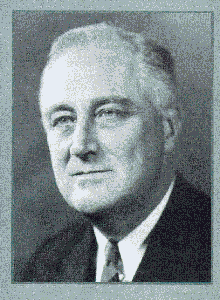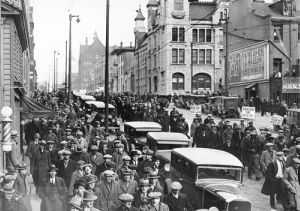Related Topics
Philadelphia Legal Scene
The American legal profession grew up in this town, creating institutions and traditions that set the style for everyone else. Boston, New York and Washington have lots of influential lawyers, but Philadelphia shapes the legal profession.
Shaping the Constitution in Philadelphia
After Independence, the weakness of the Federal government dismayed a band of ardent patriots, so under Washington's leadership a stronger Constitution was written. Almost immediately, comrades discovered they had wanted the same thing for different reasons, so during the formative period they struggled to reshape future directions . Moving the Capitol from Philadelphia to the Potomac proved curiously central to all this.
Owen Roberts
To this day, no one knows quite what to make of Owen J. Roberts, founder of one of Philadelphia's largest law firms, Prosecutor of the Teapot Dome scandal, Dean of the University of Pennsylvania Law School, Republican appointee to the U.S. Supreme Court. But then-- the source of one of the most radical revisions of our system of government since the Declaration of Independence. Little in Roberts' earlier career seemed to lead up to this action, and nothing in his subsequent civic-minded retirement from the Court seemed to indicate any particularly radical turn of character had taken place. He has been compared with a famous baseball pitcher who threw right-handed or left-handed at will, and unexpectedly, capriciously, who knows why.

|
| Franklin Roosevelt |
The issue went far beyond one clause in the Constitution, but the commerce clause was the focus point. Under the limited and enumerated powers allowed to Congress by the Constitution was :
The Congress shall have the power to regulate commerce with foreign nations, and among the several states, and with the Indian tribes.
That used to be called the " Interstate Commerce clause" until the Supreme Court announced its decision in the case of Wickard v. Filburn. When linked with the Tenth Amendment, granting to the States the power to regulate everything not specifically granted to the Federal government, this clause in the Constitution was universally taken to mean that the States had control of commerce within their borders, while Congress would control interstate commerce. Wickard v. Filburn took all that power from the states and gave it to Congress, which henceforth would regulate commerce. John Marshall had triumphed again over the hated state legislatures, but the Supreme Court had suddenly lost much of its power to overrule Congress, too. One side had won the argument, by threatening the umpire. The umpire came away less powerful, too. No wonder the jaunty Franklin Roosevelt started annual celebrations called Jefferson-Jackson Day dinners. All three presidents disliked the Supreme Court intensely.

|
| Depression of the 1930s |
To describe the background, the 1929 stock market crash was quickly followed by the economic Depression of the 1930s. No financial panic of this magnitude had been seen before, and there was a political stampede to try new and untested solutions. Even government action which actually worsened economic conditions was felt justified if it conveyed to the frightened public the image that its leaders were taking firm action. Since Socialism and Communism were among the solutions being toyed with by the public, many unfortunate actions were felt justified as a way to control the Bolshevik threat, by pre-empting its promises. Many such New Deal actions were declared unconstitutional by the Supreme Court since they involved sweeping federal revisions in the way all commerce, internal to the States as well as interstate, was conducted.
The Depression and financial panic continued through the 1936 Presidential election, which Roosevelt won "in a landslide". He took this election to mean the public would support him in anything. Immediately after the start of his new term, Roosevelt announced a plan to increase the number of Justices on the Supreme Court, appointing new ones more to his liking until he achieved a majority. He was at pains to point out that seven of the nine life incumbents had been appointed by Republican Presidents. This was, of course, the restraint intended by the Constitutional Convention, almost immediately faced by Thomas Jefferson in John Marshall's court. The idea of packing the Court with new appointees was exactly what Jefferson and Jackson had tried to do. In the meantime, the case of Filburn, a dairy farmer, came up. One of the "New Deal" agencies had assigned him a quota of 200 bushels of wheat he could grow on the side, as part of an effort to raise wheat prices by reducing the supply of it. Filburn had raised 400 bushels, but consumed the extra wheat for his own personal use, hardly a matter of interstate commerce. The Court had repeatedly declared laws like this to exceed the interstate commerce limitation and were thus unconstitutional for the Congress to enact.
Well, Owen Roberts changed his position, and Filburn lost his case. But public outcry was resounding, so Congress overwhelmingly defeated Rosevelt's court-packing proposal. Although the Court would thus have won its struggle with the Executive branch if it had remained steadfast, Interstate commerce became All-commerce by the declaration of its most dedicated opponent. Forever afterward, this change of position was referred to as "the switch in time, that saved nine." and the cuteness of that cartoon caption obscured that Roosevelt had been dealt a public slap in the face. Nevertheless, since that time, the Court has rarely had the courage to rule any action of Congress unconstitutional. Furthermore, the power of the state legislatures has shriveled because all commerce (except insurance and real estate) is regulated out of the District of Columbia, with a corresponding vast increase in the size of the Federal bureaucracy, as Congress relentlessly pushed to intervene in commerce. One important footnote to this uproar was that the insurance industry was intensely displeased with the prospect of federal regulation, and within six weeks lobbied through the McCarran Ferguson Act, restoring the "business of insurance" to state regulation. This act skirted the confrontation between Congress and the Supreme Court by prohibiting federal agencies from engaging in insurance regulation, although the pretense was maintained that the executive branch was free to regulate if it could invent a way to do it.
A few weeks before he died, Owen Roberts had all his papers burned, So, we will never know whether all this uproar was the result he had in mind.
Originally published: Friday, June 23, 2006; most-recently modified: Friday, May 31, 2019